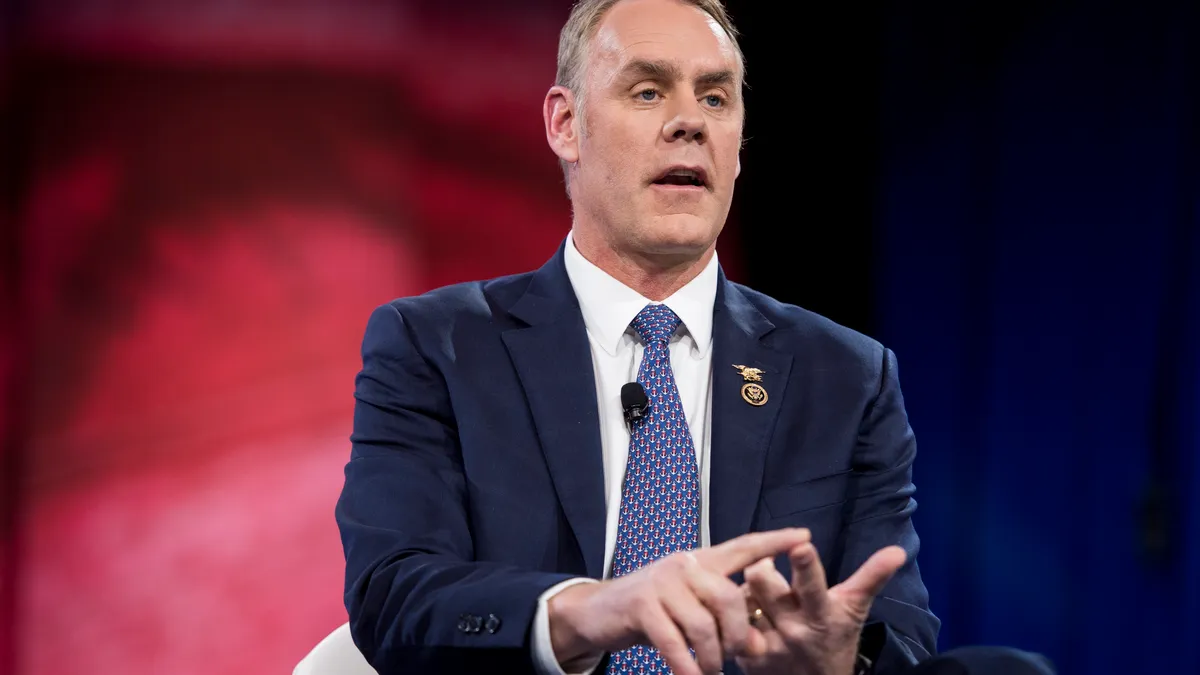Dive Brief:
- Rep. Ryan Zinke (R-MT), President-elect Donald Trump's nominee to head the Department of the Interior, said he would support an "all of the above" energy policy and called for more "objective research" on climate change if he is confirmed to the post.
- Zinke told the Senate Energy and Natural Resources Committee he would support increased energy production on federal lands, both from fossil fuels and renewable resources, while expressing support for research into "clean coal" and other advanced fossil technologies.
- On climate, Zinke said that while he believes the climate is changing, it is difficult to ascertain how much can be attributed to humans — a position not in line with mainstream climate scientists, who say humans are the "dominant cause."
Dive Insight:
The Department of Interior is responsible for stewardship of federal lands that make up roughly one-fifth of the U.S. landmass, putting it at the forefront of energy sector issues from oil and gas leases to renewable energy siting and coal production.
Throughout the second half of the Obama administration, the DOI has modestly curtailed fossil fuel production on federal lands, putting limits on oil exploration in places like Alaska and halting new coal leases last summer.
While oil and gas production has boomed throughout the Obama administration, GOP critics decried the moves as a war on fossil fuels.
In his confirmation hearing, Zinke offered them reason for hope, telling Sen. Lisa Murkowski (R-AK), the chair of the Energy and Natural Resources Committee, that he would support a full review of the DOI's extraction policies in her home state.
"I can guarantee you it is better to produce energy domestically under reasonable regulation than overseas with no regulation," he said.
But that domestic energy production won't come from selling off federal lands, if Zinke has his way. The DOI nominee said he is " absolutely against transfer or sale of public land," a longtime GOP priority.
That stance puts Zinke in line with Trump, who also opposes federal land sales, but the DOI nominee broke with the president-elect on climate, saying he believes global warming is "not a hoax" and that humans have some influence over it.
There is, however, still debate over "what that influence is [and] what we can do about it," Zinke said.
That answer was not satisfactory for Sen. Bernie Sanders (I-VT), one of the most vocal climate hawks in the Senate.
"The scientific community is almost virtually unanimous that climate change is real and causing devastating problems," Sanders said. "There is a debate on this committee, but not within the scientific community."
The Sanders comment reflects the latest climate science consensus laid out by the United Nation's Intergovernmental Panel on Climate Change. In its report on basis of climate science, the IPCC wrote it is "extremely likely that human influence has been the dominant cause of the observed warming since the mid-20th century."
Later in the hearing, Sen. Al Franken (D-MN) brought climate up again, citing a 2010 letter signed by Zinke that requested urgent climate action from the Obama White House.
Zinke declined to endorse that letter, saying he is "not a climate science expert," but will "become much more familiar with it and it will be based on objective science."
Just what that "objective science" looks like remains to be seen. The U.S. Geological Survey, housed under DOI, has done extensive research on the impacts of climate change across the United States, and Zinke referenced it in the hearing as one of his key resources if confirmed.
But outgoing administration officials have been skeptical of the Trump administration's approach to climate science, particularly after transition officials requested information from the Department of Energy on which employees worked on climate initiatives.
Whatever DOI's eventual stance on climate, Zinke said his agency will support more than just coal and gas. As part of his "all of the above" energy policy, DOI will "encourage, absolutely, wind and solar," as well as technologies to reduce the environmental impact on fossil fuels.
"We should be leading the world in clean energy technology and I think coal can be a part of that," Zinke said.













